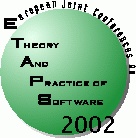

April 13, 2002, Grenoble, France
The aim of this one day workshop is to bring together researchers from academia and industry interested in the formal definition of languages, and the use of the definitions for the derivation of tools and software applications (e.g., interactive transformation tools, software renovation tools, application generators). The workshop welcomes contributions based on all kinds and styles of formal language definition including attribute grammars, algebraic approaches, action semantics, operational semantics, and denotational semantics. Many aspects of the definition of languages, and the derivation of tools and applications are independent of the actual formalism used. The workshop also welcomes contributions to compare formalisms or to discuss the benefits and drawbacks of specific formalisms.
The invited speaker at LDTA'2002 will be Charles Consel. His research interests are in the field of developing programming language techniques and tools to enable generic and well-structured system components to be built without loss of efficiency. It includes among others, domain specific languages, adaptable software components, and program specialization.
Domain-specific languages (DSLs) are being increasingly used as a realistic approach to address a program family. That is, a set of programs that shares enough commonalities to be considered as a whole. These programs may already exist or be expected to be developed. In this situation, in principle, software development can benefit from introducing a DSL in that (1) it offers concise and specific notations to express a member of the program family, and (2) it enables the development of safe code thanks to its restricted semantics and/or requirements for additional information.
The Compose group has developed DSLs for various domains such as device drivers, active networking, and process scheduling, and built some experience in designing and implementing DSLs. In this talk we will report on the outcomes of this line of work. In particular, we will attempt to provide a practical definition of a DSL, and give the conditions to make this approach successful. We will discuss actual benefits of the DSL approach. Finally, we will outline a methodology to design and implement a DSL.
Submissions will be evaluated by the Program Committee for inclusion in the formal proceedings. The proceedings will probably be published in the ENTCS series. Papers must contain original contributions, be clearly written, and include appropriate reference to and comparison with related work. Papers (of at most 15 pages) should be submitted electronically as (optionally compressed/gzipped) PostScript or PDF files to the workshop chair. The message should also contain a text-only abstract and author information. Final copies of accepted papers, after revision, must not be longer than 20 pages and have to respect the proceedings style. In addition, a special issue of a journal to publish selected papers is under negotiation.
Preliminary dates
| Submission of papers: | December 15, 2001 |
| Notification of authors: | January 31, 2002 |
| Final papers due: | February 28, 2002 |
| Workshop: | April 13, 2002 |
The workshop emerged from the 'Workshops on Attribute Grammars and their Applications' (WAGA'90, Paris, SAGA'91, Prague, WAGA'99, Amsterdam, and WAGA'00, Ponte de Lima) and 'ASF+SDF workshops' (ASF+SDF'95, Amsterdam, and ASF+SDF'97, Amsterdam). The 1st Workshop on Language Descriptions, Tools and Applications (LDTA 2001) was a satellite event of ETAPS 2001 held in Genoa.
Organizing Committee
|
Görel Hedin Department of Computer Science Lund Institute of Technology Box 118 SE-22100 Lund Sweden [email protected] |
Marjan Mernik University of Maribor Faculty of electrical engineering and computer science Smetanova 17 2000 Maribor Slovenia [email protected] |
Didier Parigot INRIA 2004 Route des Lucioles B.P 93 06902 Sophia Antipolis Cedex France [email protected] |